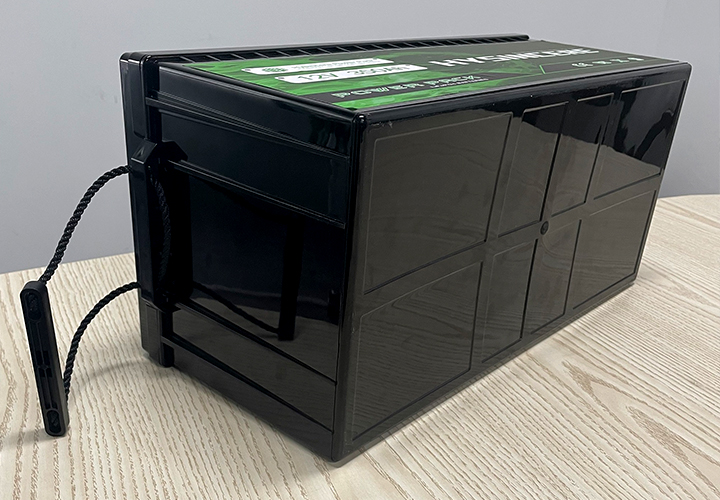source:other news
release time:2023-02-10
Hits:0
Popular:

1. The fixed -voltage charging and fixed voltage charging refers to the charging method that maintains the power supply voltage during the charging process. In the car, the battery uses this charging method. The wiring method of the fixed-voltage charging is shown in Figure 1-12, and the charging characteristic curve is shown in Figure 1-13. When charging is charging, it can be seen according to IC = (U-E)/R, and as the battery electromotive force E increases, the charging current IC gradually decreases. If the charging voltage is properly adjusted, the charging current is zero when fully charged, that is, the charging is completed. During the fixed -voltage charging, the number of single batteries on each branch should be equal to each branch, and the appropriate charging voltage should be selected at the same time. If the charging voltage is too high, it will cause overcharge, polar plate bending, active substances to fall off, and the temperature rise is too high; too low charging voltage will cause the battery to not be sufficient. Generally, a single -grid battery charging voltage is 2.5V. At the beginning of the fixed -voltage charging, the charging current is large, and 90%to 95%of the rated capacity can be reached within 4 to 5 hours. Therefore, the charging time is short, and the charging current is not required and the charging current is suitable for supplementary charging. Because the charging current is inseparable, the fixed -voltage charging is not suitable for initial charging and de -sulfide charging.
2. Fixed current charging fixed current charging refers to the charging method that maintains the charging current during the charging process. It is widely used for initial charging, replenishing charging, and de -sulfide charging. The wiring method of fixed current charging is shown in Figure 1-14, and the charging characteristic curve is shown in Figure 1-15. When the stream is charged, it is connected in series by the charged battery. Each single battery requires 2.7V when the power is sufficient, so the number of single -grid batteries connected in series = the rated voltage of the charger/2.7 (one). The charging current should be selected according to a small -capacity battery, and it should be removed in time after it is sufficient, and then continues to charge the large -capacity battery. In order to shorten the charging time, the charging process is usually divided into two stages. In the first stage, a large charging current is used to quickly restore the capacity of the battery. When the battery battery is basically sufficient, the voltage of the single -grid battery reaches 2.4V, and when the electrolyte produces the bubbles, the charging current will be reduced by half, until the electrolyte density and the battery end voltage reaches the maximum value and at 2 to 3h The inside no longer rises, and the bubbles are strenuous inside the battery. 3. The pulse fast charging pulse fast charging must be performed with a pulse fast charger. The charging current wave shape is shown in Figure 1-16. The process of the rapid charging of the pulse is: the large current of 80%to 100%of the rated capacity is used for a fixed current charging, so that the battery is charged to 50%to 60%of the rated capacity in a short period of time. When the voltage of the single -grid battery rises to 2.4V and starts the bubble, automatically control the control circuit of the charger, and start the pulse quickly charging. First stop charging 25ms (called the front stop charging), then discharge or reverse charging to make the battery storage the battery. Reverse through a larger pulse current (the pulse depth is generally 1.5 to 3 times the charging current, the pulse width is 150 to 1000 μs), and then stops the charging 40ms (called the post -stop charging). → front stop charging → negative pulse discharge instantly → post -stop charging → positive pulse charging ... This process is carried out until sufficient charging. The advantage of the rapid charging of pulse is that the charging time can be greatly shortened (the charging of new batteries requires 5h, and the charging requires 1h); the disadvantage is that it has a certain effect on the life of the battery, and the pulse rapid charger structure and expensive price are suitable for battery concentration Frequent charging and emergency requirements.
Read recommendations:
14650 Lithium Ion Battery for Electric Toothbrush
Advancements in Sodium-Ion Battery Technology: NexPower V3 and Nexcell for Prius Applications

Last article:Introduction to low temperature battery
Next article:High temperature and low temperature discharge solution
related suggestion
home solar battery system direct sales
2023-03-20portable power station with solar panel
2023-04-07lifepo4 24v manufacture
2023-04-07lifepo4 solar battery Processor
2023-04-07lithium batteries for boats wholesaler
2023-03-22portable solar power generator
2023-03-20solar powered generator
2023-05-08solar backup generator
2023-05-08solar generator for home
2023-05-08solar generator for camping
2023-05-08portable solar power generator
2023-05-08lifepo4 12v
2023-05-0851.2V 100Ah Household Energy Storage System Wall Mount Home Battery Pack
2022-10-19LiFePo4 Battery Pack 12V 350Ah
2022-09-19Rechargeable Lithium Ion Battery Pack for Medical Device
2022-10-18LiFePo4 Battery Pack 12V 200Ah for Ship Boat
2023-02-14Lithium Replacing Lead-Acid LiFePo4 Battery Pack 12V 200Ah
2022-09-19Introduction to lithium ion battery.12v 100ah lithium ion battery
2023-05-10Lithium iron phosphate battery characteristics.lithium golf cart batteries maker
2023-04-04Why Samsung 18650 is Popular
2025-03-21Hysincere Battery 2023 CHINA (GERMANY) TRADE FAIR Welcome to Visit
2023-04-22Positive electrode materials for lithium-ion batteries.lithium deep cycle marine battery
2023-08-04Silver zinc battery.best portable solar generator
2023-07-04Aluminum air batteries cannot replace the cause of lithium batteries analysis.solar powered electric generator
2023-03-08What are the advantages of the 18650 lithium battery?
2022-12-12Steel use of lithium iron phosphate batteries.best solar powered generator
2023-05-26high Lithium battery manufacturers believe that operating characteristics
2023-06-15